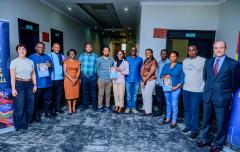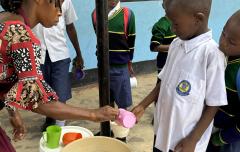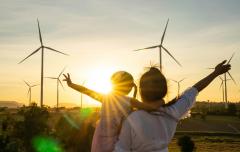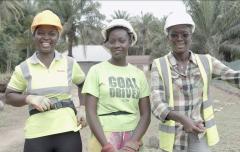Least Developed Countries (LDCs) call for the inclusion of “sustainable energy for all” as a global goal in the 2015 Development Agenda
Co-Chairs’ Communiqué
“Our Common Action Agenda to Promote Sustainable Energy in the Least Developed Countries”
High-Level Event on Sustainable Energy for the Least Developed Countries (United Nations, New York, 23 September 2013)
- We, Prime Minister Hailemariam Desalegn of Ethiopia and President Ellen Johnson Sirleaf of Liberia on behalf of the Global Coordination Bureau of the Least Developed Countries (LDCs), and Prime Minister Jens Stoltenberg of Norway, Co-Chaired a Head of State/Government level event on “Sustainable Energy for the Least Developed Countries”, which was held at the United Nations Headquarters on 23 September 2013. The event was initiated by the Government of Benin in its capacity as Chair of the Global Coordination Bureau of the LDCs.
- We express our sincere appreciation to the United Nations Secretary-General Ban Ki-moon for his “Sustainable Energy for All” (SEforALL) initiative. We commend the UN-OHRLLS for providing substantive and organizational support in organising this event. We also thank Mary Robinson, former President of Ireland and President of the Mary Robinson Foundation – Climate Justice, for moderating the event.
- Access to sustainable energy holds the key to resolving the two major challenges of our time, poverty and climate change. We recall that at the United Nations Conference on Sustainable Development (Rio+20), Member States expressed their determination “to act to make sustainable energy for all a reality and, through this, help to eradicate poverty and lead to sustainable development and global prosperity”. We are pleased by the General Assembly’s declaration of 2014-2024 as the UN Decade of Sustainable Energy for All.
- Out of the 1.3 billion people who do not have access to electricity, more than half live in the least developed countries. Currently, four out of five people in LDCs lack access to electricity and nine out of ten lack access to modern cooking fuels. In LDCs, only 27% of urban dwellers have access to modern fuels, while a mere 3% of rural dwellers have access. These rates are much lower than for other developing countries, and demonstrate the large “energy gap”.
- The Istanbul Programme of Action for the Least Developed Countries for the decade 2011- 2020 (IPoA) recognizes that access to affordable, reliable and renewable energy and related technologies, as well as the efficient use and distribution of energy will be critically important for accelerating growth, improving livelihoods and advancing sustainable development. Access to modern energy systems is about light and cooking. About reading, learning and communicating. About jobs, distribution of wealth, and prosperity. And it is about women’s health and gender equality.
- For achieving the goal of providing sustainable energy for all, energy must be fully integrated into the Post-2015 Development Agenda. Energy is the golden thread that connects poverty eradication, socio-economic transformation and overall sustainable development. Addressing the nexus between energy and other development issues should become a reality, instead of a grand concept, and must be deeply rooted in the Post-2015 Development Agenda.
- We therefore call on all relevant actors to work together to develop and establish a common global goal on energy as part of the Post-2015 Development Agenda. There is broad support for “sustainable energy for all” as a global goal, as was also highlighted during the Global Consultations and the High-Level Meeting on Energy and the Post-2015 Development Agenda, held in Oslo on 9 April, 20131. The special needs of Least Developed Countries on energy should be specifically prioritized in the Post-2015 Development Agenda. A set of 1 http://www.worldwewant2015.org/energy2015 2 targets and indicators supporting the goal should encompass all three dimensions of sustainable development, to help demonstrate that the concept of the Sustainable Development Goals is fully coherent with the development agenda beyond 2015. The three objectives of the Sustainable Energy for All initiative (universal energy access, increased efficiency and renewable energy), including its Global Tracking Framework, can provide a solid framework to build on further, while keeping them fully adaptable to different circumstances and priorities at regional, national and local levels.
- During the event, we have learnt about success stories and best-practices of sustainable energy initiatives in LDCs. These are inspiring and very promising for the future, and we hope that today’s event has encouraged many more sustainable energy initiatives to address the large “energy gap” faced by LDCs.
- We express specific concern that some of the recent energy initiatives have not yielded the expected benefits for the poorest. LDCs and their partners need to make sure that the specific energy needs of the poorest are taken into account and incorporated in the programmes of the various initiatives working to improve access to sustainable energy.
- Access to sustainable energy is the key priority for LDCs. Without access to modern and affordable energy, the prospect of development will remain a distant dream for LDCs. Increased access to renewable and clean energy will have a direct impact on the livelihoods of people and be a strong entry point for enhancing sustainable development in an integrated manner. Access to sustainable energy for all can be achieved without increasing emissions of greenhouse gases significantly. Given their low-carbon profile and rich natural capital and cultural assets, LDCs are also well positioned in the transition to a green economy via a sustainable energy mix.
- Energy goals need to be ambitious but achievable. While there cannot be a “one size fits all” approach, beyond the goal of access for all, there are a number of common challenges, such as increasing the share of renewable energy in the energy mix, improving efficiency and focusing on funding for energy which need to be addressed effectively.
- The transition to sustainable energy will require critical rethinking by LDC decision-makers and the goals need to be followed with well planned and coordinated action based on national energy and development strategies. LDC governments need to create enabling and supporting policy and regulatory frameworks to promote commercial investments, get involved with a broad range of stakeholders, including reaching out to the poorest and supporting bottom-up approaches, and share and learn from successful initiatives. We need to change the way we produce and use energy, and increase the energy mix. We need more energy from renewable energy resources.
- In ensuring the energy access for all, mitigating climate change and turning sustainable development into reality, all stakeholders need to join their efforts to make sure that the most vulnerable countries will enter the path of transition to sustainable energy. The international community must provide the necessary support to leverage financial resources and help LDCs’ actions to build capacity in order to seize the opportunity for transformative change that will scale up poverty eradication and sustainable development in these countries. Publicprivate partnerships are an important way to overcome practical challenges and meet financing gaps.
- The LDCs should receive a special focus throughout the Decade of Sustainable Energy for All (2014-24). We invite the UN-OHRLLS to reflect progress in LDCs in the area of sustainable energy in the follow up reports on the IPoA during this decade, and to continue to support LDCs, including through facilitating partnerships involving development partners from both North and South, national and international private sector, UN system organizations, civil society and other relevant stakeholders.



